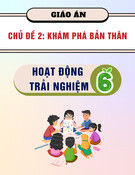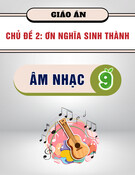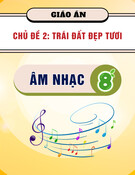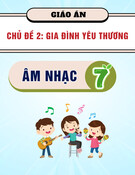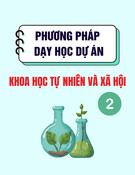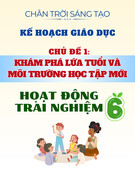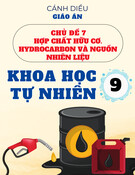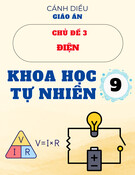OPTIONAL LESSON 27
WRITING
1. Aims:
Writing sentences and a short text about new ways to learn English
2. Objectives: By the end of the lesson, students will be able to:
Language:
Making a complete sentence using vocabulary in the lesson Write a short text about their ways to learn English using electronic devices
Skills: Writing sentences using given prompts/ instructions.
Attitude: raise their awareness of learning English and using their electronic devices
effectively
3. Teaching aids: handouts.
4. Teaching methods: groupworking, communicating 5. Anticipated problems: Students may have difficulty in linking words to make meaningful sentences.
6. Procedures:
Teacher’s activities Students’ activities
Greeting Checking class’s attendance
Warmup (3 mins) Work in groups: List different devices that students use to support their study Report their answer
Work in groups Discuss with group’s members to think of their devices that they usually use to support their learning Example: Smartphone, tablet, computer, media player, radio, TV…
Read the short biography of Britney Spears Discuss with friends to add details to the profile.
Expected answers: 1. Electronic devices make my school life much easier and more enjoyable. 2. Electronic devices allow teachers to prepare lessons and grade papers. 3. Electronic devices may distract students Sentencewriting (10 mins) Sentence completion: Ask the students to make complete sentences using the given words or instruction: 1. Electronic devices / make / my school life / easier / more / enjoyable. 2. Electronic devices / allow / teachers/ prepare / lessons / grade / papers. 3. Electronic devices / distract / students/ study. 4. Students / spend / many hours/ read / watch /information / videos/ the internet / and /
forget / assignments. 5. Personal electronic devices / bring / more / harm / good / students.
from their studies/ from studying. 4. Students usually spend many hours reading and watching information and videos on the internet and forget their assignments. 5. Personal electronic devices may bring more harm than good to students.
Write a short text Students’ answers may vary.
Short textwriting (22 mins) Ask students to choose one of 2 topics and write a short text: 1. If you are given a computer, what will you do with it? 2. Do you support the idea that students at school age can use cell phones freely? Ask students to follow some writing steps: + Brainstorm ideas + Decide the ideas to write + Draft writing + Rewriting Go around to give help if needed
Post writing (10 mins) Call on two students to write their writing on the board Elicit and correct the mistakes, comment on the language
OPTIONAL LESSON 28
SPEAKING
1. Aims:
Speaking/Talking about the environment around.
2. Objectives: By the end of this lesson, students will be able to:
Language:
talk about problems and solutions to the problems that students can see and do asking and giving information related to environment
Skills: Improve speaking and listening skills through presenting, listening and answering,
interviewing
Attitude: raise students’ awareness of protecting the environment
3. Teaching aids: video, handouts 4. Teaching methods: pairworking, communicating
5. Anticipated problems: Students may lack vocabulary to express their ideas go around to give help.
6. Procedures:
Teacher’s activities Students’ activities
Greeting Checking students’ attendance
Activity 1 (10 mins) Find someone who…. Work in groups
Interview partners to check the given information Ask students to work in group of 8 Tell students to interview their partners about their habit of living:
Report results to the whole class
Find somebody who…. ….wear comforter when going out ….plant (want to plant) vegetables themselves to eat ….used to plant trees at Tree Planting Festival …always put rubbish in right places …have ever put rubbish in wrong places …feel annoyed when sitting next to a man smoking …ask a man smoking to stop at public places
Ask some groups to report the results to the whole class.
Activity 2 (10 mins)
Work in groups of 8 (2 tables) and discuss the problems related to environment that they can see themselves. Go around and give help if needed. Ask some group to report their answer and other group add more problems if they have Teacher write the problems on the board Work in groups: discuss and list different problems that they can see every day. Report their answer Give comments and add more information if they have
Activity 3 (10 mins) Work in groups: Discuss the solutions to solve the problems they have listed Go around and give help Call some students to report their answer Ask other groups to give comments and add more information if they have Work in groups: discuss the solutions that may be used to solve the problems they have mentioned. Report their answer Comment and add more information
Activity 4 (13 mins) Work in pairs: Ask and answer
Work in pairs: Ask and answer: 1. What have you done to make the environment around you better? 2. What do you intend to do to better your environment? Ask some students to practice aloud
Consolidation
Summarise main points Give comments on students’ participation and attitude Instruct homework: practise speaking at home
OPTIONAL LESSON 29 GRAMMAR: REPORTED SPEECH
1. Aims/ Objectives: By the end of the lesson, Ss will be able know how to change a directed sentence into an indirected one. 2. Preparation: Teacher: prepare lesson plan, textbook, Students: prepare the lesson at home 3. Teaching aids: Textbooks, whiteboard makers 4. Teaching methods: Integrated, pair – working and group working 5. Anticipated problems: students may get difficult in remembering some changes from direct sentences to indirect sentences 6. Procedures:
Teacher’s activities Students’ activites
Greeting WARM UP (5’) Greeting Checking students’ attendance
T writes 2 sentences on the board and asks Sts to give the comments 1. He says, “I am a student ” 2. He says he is a student T leads in the lesson PRESENTATION (20’) 1.Definition There are 2 ways to express someone’s speech:
ắ ạ ự ế ờ Listen and note down i nguyên văn l ấ ặ
- Direct speech : we repeat the origin of what speaker say i nói ượ ặ c đ t trong d u ngo c kép và sau ấ
-
ờ (Trong l i nói tr c ti p ta nh c l ườ ủ i nói và đ c a ng ấ ặ ẩ ấ 1 d u ph y ho c 2 d u ch m) Indirect speech : there are some changes in the indirect speech. We do not repeat their exact word but we give the meaning of what was said.
Eg : Hoa says , “I want to go home” Hoa said she wanted to go home
1. Reported speech - Repord structures or report sentences consist of 2
clauses . 1st clause is the reporting clause . It contains a reporting verbs as : say , tell or ask.
- The 2nd clause is the reported clause. It contains the
information that we are reporting. The reported clause can be a “that clause”, a “toinfinitive clause”, an “if / whether clause ” or a “whword clause” - Eg: Lan asked me if/ whether I wanted to go
He told us to come earlier next time. She asked me where I lived. - When reporting questions: + (WHQuestions):
E.g.:
ask + O + WHword + S + V She asked, “What is his job?” => She asked what his job was.
+ (Yes/NoQuestions)”
E.g.:
ask + O + if/whether + S + V She asked, “Are you a teacher?” => She asked me if/whether I was a teacher.
2. remember - Tenses in the reported clause do not change after the
present or future reporting verbs.
Eg : He says, “I am a student ” He says he is a student.
- Tenses in the reported clause will change after the past
reporting verbs.
Changes in reported speech
Note down
A. TENSES
Reported Speech Past simple Past progressive Past simple / Past perfect Past perfect progressive Past perfect
Direct Speech Present simple Present progressive Past simple Past progressive Present perfect Present perfect progressive Past perfect progressive Past perfect Past perfect progressive Past perfect Past perfect progressive
B. TIMES Direct Speech now today Tonight Tomorrow yesterday Last night Next week
Reported Speech Then / immediately That day That night The next / following day The day before/the previous day The night before The following week
A year ago A year before/ earlier
C. PLACES
Direct Speech Here This these Reported Speech There That those
D. PRONOUNS / ADJECTIVES
Pronoun changes depend on the view of the reporter Ba : “I will give you a lift home , Hoa” Ba told Hoa he would give her a lift home (S.o else reported ) Ba told me he would give me a lift home (Hoa reported)
PRACTICE (17’) Change the sentences into reported speech. 1. “I am living on Jupiter” => He says ….. 2. “I’ve just sat for my final exam” => Nam said ………... 3. “I can’t come to the party because I have to do my homework ” => She tells me that………./ she said that………. 4. “John phoned me last week” => she told us that…………. 5. “When we arrived , both drivers were lying on the street unconsciously” =>The police reported that………….... 6.”The E1 train leaves at 10:00 tonight” =>They informed us that…. 7. “Which attractions do you want to go?” => Hoa asks Liz……. 8. “I don’t know what you are doing ” => Liz told Tim that….. 9. “My sister is arriving here today” =>He said that…. 10. “When we came, they had left” =>They told us …….
Go around to give help if need Call some students to write their answer on the board and check Give comments and marks
Suggested answer: 1. ..he is living on Jupiter 2. …he had just sat for his final exam 3. …he can’t come… because he has to do his homework …he couldn’t come….he had to…. 4. …John had phoned her the week before. 5. …when they had arrived, both drivers had been lying …. 6. ….The E1 train left at 10 that night. 7. ….which attraction she wanted to go. 8. ….she didn’t know what he was doing. 9…..his sister was arriving there that day. 10. …when they came, they had left.
WRAPPING (3’) T revises the lesson T asks Sts to do exercises Homework: Change into the reported speech: 1. She said, "I went to the cinema yesterday." 2. He said, "I am writing a test tomorrow." 3. Lan asked, “Do you want to join my party next weekend?” 4. She said, "I am not hungry now." 5. They said, "We have never been here before."
6. They asked, "Who were in London last week?" 7. He said, "I will have finished this paper by tomorrow." 8. “I will apply for my visa tomorrow,” She said. 9. He said “ I was born in 2000”. 10. My teacher said “The sun rises in the East”.
T gives comment the lesson.
OPTIONAL LESSON 30
PRACTICING READING
1. Aims: Develop reading skills through reading about nature
2. Objectives
By the end of the lesson, Students will be able to:
(cid:0) Skill: develop such reading micro skills as scanning for specific information, intensive
reading for details, and guessing meaning in context.
(cid:0) Language: broaden their knowledge and vocabulary related to environment.
(cid:0) Attitude: help Sts be more interested in learning English and be more confident in
communicating with more vocabulary and improving reading competence
3. Teaching Aids: handouts
4. Teaching methods: communicative approach
5. Anticipated problems:
Sts may be confused to choose the correct answer
6. Procedure
Teacher’s activities Students’ activities
Greeting and the
WARM UP: (8 min) Greeting Checking students’ attendance
Riddle: monitor inform the whole class’s attendance.
Listen to the teacher and try to find the answer as quick as possible:
1. What is black when it is clean and white when it is dirty? 2. What will make more noise in your house than a dog? 3. Which letter is always trying to find reasons? Ask students to listen carefully to the riddle and find out the answer Check and give them encouragement
1. the blackboard 2. two dogs 3. “y” why PRACTICE READING SKILL (33 min)
Exercise 1: Read the passage and choose the best answer:
In Southeast Asian, many forests have been cut down to
produce timber and to clear land for farms and industries. The destruction of forests has reduced the living space of wildlife. Much of Asian’s wildlife is also threatened by overhunting. Many people kill animals for food or hunt them to sell to zoo, medical research, and pet trader. Because of habitat destruction and overhunting, many large Asian animals, including elephants, rhinoceroses, and tigers, have become endangered.
Answer: Exercise 1: 1. C 2. A 3. A 4. C 5. D
In China, people have cut down most of the forests for wood, which has caused serious soil erosion. The soil is deposited in rivers and streams, which lowers the quality of the water. The Huang He, or Yellow River, is so named because the lightcoloured soil gives the water a yellowish colour. The soil has also raised the riverbed. As a result, the Huang He often floods, causing great property damage and loss of life along its banks. 1. The living space of wildlife in Southeast Asia_______
A is a threat to farmers B is near farms and industries. C has been reduced when forests are cut down. D is rebuilt when people destroy forests
2. The word overhunting has the closest meaning to________
A hunting too much B hunting in the highlands C hunting overseas D hunting for wildlife
3. Rhinoceroses and elephants are mentioned as an example of
_______. A endangered animals in Asia. B large animals kept in zoos. C animals attracted to medical research D animals traders want to have
4. The Huang He________. A is a deep river in China B receives soil which betters the quality of water C has its name from the colour of its water D runs between forests
5. The Huang He often floods because __________.
A of the low quality of the quality B wood is deposited in rivers
C water from many streams flows into it D the river is shallow due to the raised riverbed
Exercise 2: Read the passage and choose the best answer:
We have cut down so many trees that there are now vast
Exercise 2: 1. C 2. D 3. C 4. B areas of waste land all over the world. As a result, farmers in parts of Africa can’t grow enough to eat. In certain countries in Asia there
5. C
B. talk much about the problem D. can’t plant enough to eat
is too little rice. Moreover, we do not take enough care of the countryside. Wild animals are quickly disappearing. For instance, tigers are rare in India now because we have killed too many for them to survive. However, it isn’t simply enough to talk about the problem. We must act now before it is too late to do anything about it. Join us now to save the earth. This is too important to ignore. 1. Since so many trees are cut down,……………………… A. there is too little rice in Asia B. tigers are rare there are vast parts of wasteland C. D. wild animals are quickly disappearing 2. Farmers in parts of Africa……………………… A. kill so many tigers C. save the earth 3. Tigers in India are rare because…………………………. B. we ignore them A. they don’t eat enough D. we act C. many of them are killed 4. According to the reading, we must………………………… B. act now to save the earth A. survive now C. cut down trees D. talk about the problem 5. Tigers are classified as……………………………… B. farmers C. wild animals D. trees A. rice
Provide students with new words: + rhinoceroses (n) + habitat (n) + riverbed (n) + erosion (n) set time for students to do Call some students to do exercises on the board Check and give comments
Homework (2 min)
Learn by heart all new words Translate 2 passages into Vietnamese
Comments (2 min)
- Attendance - Participation
Strong points and weak points
OPTIONAL LESSON 31 PRACTICE SPEAKING AND LISTENING
Aims:
(cid:0)
1. Speaking and listening about nature and conserving the nature. 2. Objectives: By the end of the lesson, students will be able to Knowledge:
(cid:0)
(cid:0)
(cid:0)
know to give the advice or solution to a problem in their real life. listen to the vocabulary related to the environment and nature Language: improve speaking and listening skills through presenting, listening and interviewing Attitude:
(cid:0) get students involved in the nature or real situation in which students can use language to express their ideas Teaching aids: projector Teaching methods: Game organizing, groupworking, student reports by individual, interview,
Anticipated problems: Students may have difficulty in finding vocabulary to speak out their
3. 4. etc 5. ideas or they may not identify the vocabulary in listening task. 6. Procedures
Teacher’s activities Students’ activities
- Greeting and the
WARM UP ( 10 min ) Greeting Checking students’ attendance
monitor inform the whole class’s attendance.
Work in groups Listen to the teacher and find out one that should be odded Note down their answers and then 1 representative will write on board
Answer:
1. Autumn
2. kill
3. waste
(cid:0) Odd one out: (cid:0) Practice listening to the vocabulary related to the nature and environment. (cid:0) Organize the class into 4 groups and play game (who climb faster?) (cid:0) Give clear instructions, give an example: when teacher read: measles, cancer, disease, AIDS, students quickly note down and odd out “disease”. It is a common noun, not a name of a disease. (cid:0) Teacher read aloud: 1. May, Spring, Autumn, Winter 2. grow, kill, develop, increase 3. keep, conserve, save, waste 4. forest, ocean, sea, river 5. duck, chicken, mouse, goose 6. earthquake, flood, storm, sunny 7. chicken, tiger, lion, dog 8. mountain, hill, zoo, forest
(cid:0) Use projector to show all the words and check
4. forest
(cid:0) Give feedback
5. mouse
6. sunny
7. chicken
PRACTICE SPEAKING ( 10 min ) Situation: Students have to talk about their favourite animal. They will work on 3 groups of animals: pet, wildlife or domestic animal
8. zoo
Students will work in 6 different groups and choose to talk about one group of animals. Firstly, each person will think of one animal, write in a piece of paper, cross the coincided name, then put them prone, each student will pick one piece of paper and talk about the animal in the paper. Express their love or unlove Go around and give support to the students if necessary Call some students to present in front of the others
PRACTICE LISTENING ( 21 min ) 1. Listen to the recording and fill in the blanks with one of
Suggested: Pet: dog, cat, golden fish, pigeon, canary, parrot… wildlife: lion, tiger, leopard, deer, zebra, giraffe, whale… domestic animal: pig, buffalo, cow, horse, chicken, duck, turkey… Student A: Oh, I have a cat. It is not my favourite pet. I am afraid of its meow at night. I am also allegic to its fur. Student B: It’s surprising. I have a parrot – my favourite pet. I love parrots because they can become a friend at home. I have a parrot and I can play with it all the time. I teach it to talk, feed it, take care of it…Oh, I like to do everything with it. ….
Answer: Listening 1
1. A
C. cloud B. clean
2. C
D. bright B. sun C. sunshine D. shine
B. cloud D. bird
3. B
C. wind B. temperature D. nature
4. B
the missing words/ phrases in A, B, C or D: Moday will be a beautiful day. We’ll have (1) _____ skies and (2) _____ all day. It’s a great day to be outside – sunny, hot, and not one (3) _____ in the sky all day. We will have a high (4) _____ of twentyone degrees Celsius and a low of (5)_____ degrees. 1. A. clear 2. A. sonshine 3. A. loud 4. A. temperate C. temper 5. A. eleven B. even D. elephant C. animal
5. A
2. Listen to the recording and circle the incorrect time for Listening 2 each movie:
1. 5:30
4. JUNGLE MADNESS
2. 5:35
1. ROBBERY IN PARIS 2. LOVE IN THE BRONX
3. SUPPER DOG SAVES THE WORLD
3. 7:45
4. 10:45
1:45 5:35 7:50 10:30 1:10 3:20 5:30 7:45 10:45 12:00 2:38 4:42
12:35 2:47 5:30 8:00 10:13
HOMEWORK (2 min) (cid:0) Revise the lesson, learn by heart new words in the lesson
COMMENTS (2 min)
OPTIONAL LESSON 32
CONDITIONAL SENTENCES TYPE 1, 2
1. Aims: Practice working with conditional sentences type 1, 2
2. Objectives:
By the end of the lesson, Students will be able to:
Language: know how to use conditional sentences that they have learnt correctly through
some exercises: giving right form of verbs, rewrite the sentences
(cid:0) Skill: writing, reading
(cid:0) Attitude: help Sts be more interested in learning English, be more confident in expressing
their ideas.
3. Teaching Aids: handouts
4. Teaching methods: communicative approach, groupworking
5. Anticipated problems:
The students may get difficulties rewriting sentences using conditional sentences
6. Procedure
Teacher’s activities Students’ activities
WARM UP (7min) Greeting Checking students’ attendance
Make up situations Ask students to look at the pictures and imagine situations that generate conditional sentences.
Greeting and the monitor inform the whole class’s attendance. Answer: 1. If I had much money, I would buy a car 2. If ….
ề ệ ạ ượ ọ ề ệ c g i là câu đi u ki n có PRESENTATION (10 min) 1. Conditional sentence type 1 Use: câu đi u ki n lo i 1 còn đ Do as instructed Note down
ể ả ề ệ hi n t i .Đi u ki n có th x y ra ở ệ ạ hi n t ặ i ho c
ự ở ệ ạ th c ươ t ng lai.
ệ ạ ơ i đ n ) , S + Will(can,may) + V
Form: If + S + V (hi n t (nguyên m u) .ẫ
Give more examples ừ
ể ễ ả ộ ề ộ m t hành đ ng
Ex: If it is sunny ,I will go fishing. Note: Unless = If .... not ( Tr khi) If he doesn’t come, I will bring this package to him Unless he comes, I will bring this package to him 2. Conditional sentence type 2 Use : câu đi u ki n lo i 2 dùng đ di n t ậ ở ệ ạ ệ không có th t ạ hi n t
i. ứ ơ Form : If + S + V(quá kh đ n ) , S +Would (could , might
..) + V( nguyên m u).ẫ
ề ề ừ ế ộ ừ
Ex: If I knew his telephone number, I would give it to you. ệ ệ trong m nh đ đi u ki n n u là đ ng t Note : Đ ng t ủ ữ ấ ả t c các ch ng . ộ tobe thì ta dùng were cho t
Ex. If I were you , I would go abroad. 2. Giving examples Ask students to give some examples using conditional sentences type 1,2
PRACTICE: (25 min)
Deliver the handouts with exercises
lost Do exercises Suggested answer: Exercise 1: 1. gave up 2. am – will refuse 3. will forgive 4. sold 5. find 6. will get 7. would happen 8. is 9. doesn’t rain 10.
Exercise 1: Put the verbs in brackets in the correct form of conditional sentence type 1 or type 2
1. You would feel better if you (give up) smoking. 2. I’m sure Alan will help you. I (be) very surprised if he
Exercise 2: 1. ..get better marks if you don’t study harder. (refuse).
2. …tired, I would concentrate
properly
3. …rich and famous, I would travel around the world. 4. …were you I would pay
more attention to the road when driving
3. She (forgive) you if you tell her the truth. 4. If I (sell) my car, I wouldn’t get much money for it. 5. If I (find) your ring I’ll give it to you immediately. 6. I’m sure if Sarah applies for that job, she (get) it. 7. What (happen) if I pressed that red button? 8. I’ll phone you immediately if there (be) any news. 9. I’ll cut the grass this Saturday if it (not rain). 10. My uncle gave me this watch. He would be
5. …watching too much TV,
upset if I (lose) it.
you will not have a headache tomorrow.
Exercise 2: Finish the second sentence so that it has the similar meaning to the first one.
1. Study harder and you’ll get better marks!
6. …we don’t leave the milk out of the fridge, it’ll go off.
You won’t …
7. …you give me all your
2. I’m too tired to concentrate properly.
If I weren’t …
3. My dream is to become rich and famous, and travel around
the world If I became…
4. I advise you to pay more attention to the road when driving
money, I will kill you. 8. ..were not busy, I would go out with you this evening. 9. …were your true friend, he would give you good advice
If I…
5. You’ll have a headache tomorrow if you watch too much TV
10. … had a garden, we would grow our own vegetables.
Unless you stop….
6. We don’t leave the milk out of the fridge or it’ll go off.
If…
7. Give me all your money or I’ll kill you.
Unless…
8. I’m too busy to go out with you this evening
If I…
9. He doesn’t give you good advice because he isn’t your true
they are different in tenses used and usage. friend. If he…
10. We don’t have a garden, so we don’t grow our own
vegetables. If we… Provide students with help, new words if needed. Call some students to do the task Give feedback
CONSOLIDATION (2min)
Ask students talk again about the difference between conditional
sentence type 1 and type 2
HOMEWORK (2 min)
Revise the lesson at home Redo the exercises
COMMENTS (2 min)
- Attendance, Participation, Strong points and weak points
OPTIONAL LESSON 33
PRACTICING READING
1. Aims: Develop reading skills through reading about ecotour and natural environment
2. Objectives
By the end of the lesson, Students will be able to:
(cid:0) Skill: develop such reading micro skills as scanning for specific information, intensive
reading for details, and guessing meaning in context.
(cid:0) Language: broaden their knowledge and vocabulary related to environment.
(cid:0) Attitude: help Sts be more interested in learning English and be more confident in
communicating with more vocabulary and improving reading competence
3. Teaching Aids: handouts
4. Teaching methods: communicative approach
5. Anticipated problems:
Sts may be confused to choose the correct answer
6. Procedure
Teacher’s activities Students’ activities
Greeting and the
WARM UP: (8 min) Greeting Checking students’ attendance
monitor inform the whole class’s attendance.
Listen to the teacher
Groupworking: Discuss the situation: If you are asked to choose one place to spend your vacation, an ecotour with beautiful landscapes or an indoor tour with many modern facilities and artificial nice scenes, which do you prefer? Why?
Discuss
Ask students to give their answer Give comments
Present their opinions
PRACTICE READING SKILL (33 min)
Exercise 1: Fill in each blank with a suitable word in A, B, C or D:
Answer: Exercise 1: 1.B 2. B 3. A 4. C 5. B
D. take
C. bring C. dangerous D. small C. birds
B. provide B. wild B. victims B. shopping C. boating B. makes D. insects D. skiing D. wants C. is
As an ecotourism site, it can (1)………….tourists with beautiful landscape in the biosphere reserve. Tourists can trace (2) ………….animals and watch them hunting their (3)…………..at night. Also, they can go (4)…………along Dong Nai River to Bau Sau to view peacocks’ graceful dances. At present more and more visitors come to Nam Cat Tien National Park on their ecotour. Thanks to this, the economy in the local area is flourishing. This (5) …………local authorities more interested in developing this kind of tourism. 1. A. give 2. A. mad 3. A. preys 4. A. fishing 5. A. helps Exercise 2: Read the passage and choose the best answer for each question:
Exercise 2: 1. B 2. A 3. C 4. C 5. D
More than two hundred years ago, the term “environmental pollution” was quite strange to people. They lived healthily, drank pure water, and breathed fresh air. In those days, industry was not welldeveloped. Nowadays, the situation is quite different. The world today is faced with many major threats. The most dangerous threat of all is war, and after the threat of war is pollution. People all over the world are worried about things that are happening to the environment. Actually it is man that is destroying the surroundings with many kinds of wastes from the devices that make human lives more comfortable and convenient. Everybody knows that cars emit dangerous gases that cause poisonous air and cancer, but no one wants to travel on foot or by bicycles. Manufactures know that wastes from factories make water and soil polluted, but they do not want to spend a lot of their money on treating the wastes safely. Scattering rubbish is bad for our health, but no one wants to spend time burying it. Is it worth talking a lot about pollution? 1. More than two hundred years ago ________.
A. the environment was polluted as much as it is today. B. people knew nothing about environmental pollution C. air was polluted badly D. people were faced with pollution
2. In former days, people _________.
A. breathed fresh air, drank pure water and lived healthily B. breathed polluted air, drank pure water and lived healthily C. lived in the polluted environment D. were worried about pollution
3. The most dangerous threat that the world is faced with is _________.
A. pollution C. war
D. air B. water 4. Everybody knows that cars emit dangerous gases ___________.
A. so they do not travel by car any longer B. so they prefer travelling by bicycle C. but they still prefer travelling by car D. they no longer use cars
5. Factory owners _______.
A. know nothing about pollution B. have no awareness of pollution C. treat wastes from their factories safely D. do not want to spend money on treating the wastes safely
Provide students with new words: + biosphere (n) + reserve (n) + scatter (v)
+ bury (v) set time for students to do Call some students to do exercises on the board Check and give comments
Homework (2 min)
Learn by heart all new words Translate 2 passages into Vietnamese
Comments (2 min)
- Attendance - Participation
Strong points and weak points


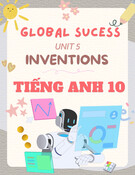

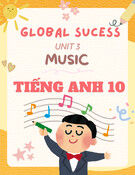
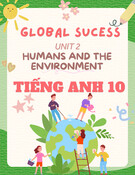




![Giáo án Tiếng Anh 10 Friends Global Unit 1: Feelings (Cảm Xúc) [Mới Nhất]](https://cdn.tailieu.vn/images/document/thumbnail/2025/20250807/hoangphuc03/135x160/140_giao-an-tieng-anh-10-friends-global-unit-1-feelings.jpg)
